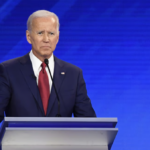The Biden administration’s recently unveiled policy toward North Korea won’t work. There’s only one way to denuclearize the hermit kingdom: Compel China to intervene by threatening to support a Japanese and South Korean nuclear bomb.
By Aaron Kliegman
President Obama tried “strategic patience” with North Korea. President Trump sought a grand bargain. Now, President Biden is pursuing something in between.
“Our policy calls for a calibrated, practical approach that is open to and will explore diplomacy with [North Korea],” White House Press Secretary Jen Psaki said last month. “Our goal remains the complete denuclearization of the Korean peninsula.”
Another US official said the Biden administration is “prepared to offer relief for particular steps,” meaning Washington will lift economic sanctions if North Korea curtails its nuclear program.
The idea is to try more engagement than Obama but less than Trump, with the same objective in mind: No more North Korean nuclear weapons.
Biden discussed this middle-ground approach on Friday with South Korean President Moon Jae-in, who was in Washington on an official visit. Moon, who will leave office next May, is eager to jumpstart diplomacy with Pyongyang and nudged Biden to share his diplomatic urgency.
North Korean leader Kim Jong Un is watching closely and feels no such urgency. He knows Biden’s approach won’t work.
As should we.
For decades now, the US has offered just about everything to induce North Korea to give up its nuclear weapons — food, fuel, money, even light water nuclear reactors. The US has also imposed biting, extensive economic sanctions, threatened to use military force, and pursued comprehensive diplomatic agreements.
Every initiative has failed. North Korea’s nuclear capabilities continue to advance.
But this time, we’re told, it’ll be different.
“We understand where previous efforts in the past have had difficulties and we’re determined to try to learn from those past efforts,” a senior Biden administration official told USA Today.
That sounds nice, but it misses the point: North Korea will not denuclearize in negotiations with the US no matter what diplomatic approach Washington takes. Nuclear weapons give North Korea global relevance and, more importantly, ensure the regime’s survival. Kim believes his nuclear arsenal is the only thing stopping him from being overthrown and killed like Saddam Hussein in Iraq and Muammar Gaddafi in Libya.
Direct diplomacy won’t solve the North Korean nuclear issue. Nor will a mix of coercion and diplomacy for the same reason: Nothing trumps survival. Biden’s approach will inevitably end in failure.
So, what options does the US have?
War is one. The US and its allies could launch military strikes against North Korea’s nuclear sites and prepare for a full-on invasion and subsequent occupation. That could solve the current problem. But the cost in blood and treasure would simply be too great to pursue this option.
Deterrence is another option. The US could learn to live with a North Korea capable of targeting the United States with nuclear weapons. Both countries would just go about their business and deter the other with the threat of nuclear attack. But there’s hardly a guarantee this would preserve the peace, especially with someone as savage as Kim in power. Not to mention every anti-American regime around the world would receive the same message loud and clear: Get nuclear weapons and the US can’t touch you.
That leaves one more option: Getting China to pressure, influence, and force its North Korean ally (and neighbor) to denuclearize.
The China route is no guarantee, to be sure, but it’s the only realistic shot of removing North Korea’s nuclear weapons. Indeed, the North relies on China for its survival, and the Chinese are the only ones with the access and ability, short of war, to impel Pyongyang.
There’s only one way to compel China to do this: by telling Beijing, in no uncertain terms, that the US will encourage South Korea and, more importantly, Japan to build their own nuclear weapons unless the Chinese help. The threat of supporting a Japanese (and South Korean) nuclear bomb is the only thing that will scare China enough to act.
From there, the US and China would both need to accept an independent North Korea that may side more with Beijing but isn’t actually allied with either country.
Critics will note this approach undermines America’s commitment to preventing nuclear proliferation. That’s certainly correct. But how badly do we want to get rid of North Korea’s nuclear weapons?
In his first address to Congress, Biden labeled North Korea’s nuclear program a “serious threat.” If that’s true, then we need to get serious about eliminating this threat. A sober examination makes clear there’s only way to make that happen.
Now, is the benefit of denuclearizing North Korea worth the potential cost of supporting a Japanese nuclear arsenal? Well, that’s another discussion entirely.
Newt hosts monthly virtual events in which he discusses news of the day and why it matters to you and your community. These Newt Live events are your opportunity to communicate directly with Newt. We hope you will join us next time and let Newt answer your questions and provide his insight on the issues that concern you most.
JOIN TODAY to be a part of this special event and receive a BONUS GIFT. Click here to join Newt’s Inner Circle.






